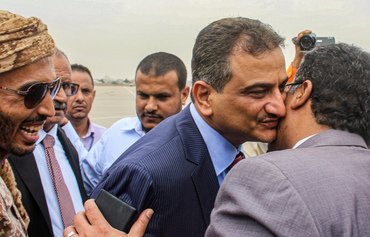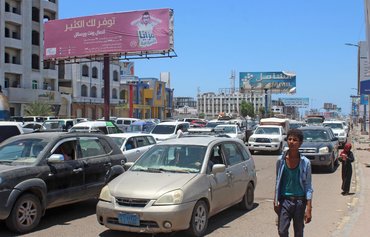The Yemeni government began talks Thursday (August 13th) in Riyadh with the Southern Transitional Council (STC) to form a new government and accelerate the implementation of a power-sharing agreement signed last November.
The Riyadh Agreement pledged to end hostilities between both sides and would see the government return to Aden and place armed forces from both sides under the authority of the defence and interior ministries.
In July, Yemeni President Abd Rabbu Mansour Hadi, exiled in Riyadh, instructed Prime Minister Moeen Abdulmalik to form a new cabinet within 30 days and announced the appointment of a new police commander and governor for Aden.
During his meeting with STC representatives in Riyadh, Abdulmalik emphasised the new government's priorities include enacting sustainable reforms, fighting corruption, rescuing the economy and normalising living conditions in liberated provinces.
It will also focus on "unifying national forces to end the Houthis' coup", according to a press statement Thursday.
A Saudi committee arrived in Aden Thursday to oversee the implementation of the military part of the Riyadh Agreement.
The committee, headed by Maj. Gen. Mohammed al-Rubaie, would closely monitor the deployment of forces on the ground, especially in Sheikh Salem and Shaqra in Abyan province.
It aims to draft a plan with practical measures for the implementation of the military part of the agreement.
Implementation delays serve Houthis
"The implementation of the military aspect will make the implementation of the entire agreement a success," political analyst Adel al-Shujaa told Al-Mashareq, noting that both sides are responsible for making these efforts succeed.
The government and the Arab Coalition have stressed the importance of the Riyadh Agreement in unifying the domestic front and focusing efforts on the liberation of the remaining provinces from the Houthis, he said.
"Any obstacles to implementing the agreement will only serve the Houthis and other terrorist groups," he added.
Political analyst Faisal Ahmed said accelerating the implementation of the Riyadh Agreement and forming a new government "are necessary to confront the economic and infrastructure challenges residents of Aden and other liberated provinces are now facing".
The successful implementation of the military part of the agreement, including the re-deployment of forces, and the pull-out of STC forces from Aden will consolidate the government's ability to confront the economic challenges, he said.
"Failure to implement the agreement will mean hunger, chaos and conflict in Aden, Abyan and other liberated cities in the south," he said.

![Yemeni Prime Minister Moeen Abdulmalik gives an interview with the press at al-Maashiq presidential palace in the southern port city of Aden's Crater district on December 12th, 2018. [Saleh al-Obeidi/AFP]](/cnmi_am/images/2020/08/14/25528-Yemen-Aden-PM-600_384.jpg)







What is that language? Separatists?! We're free people. The northerners are traitors. They could have prevented the 94 war. The Arab South is a free people. Let liars go to hell!
Reply1 Comment(s)